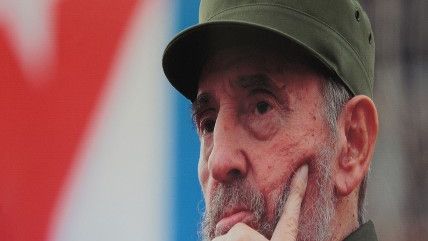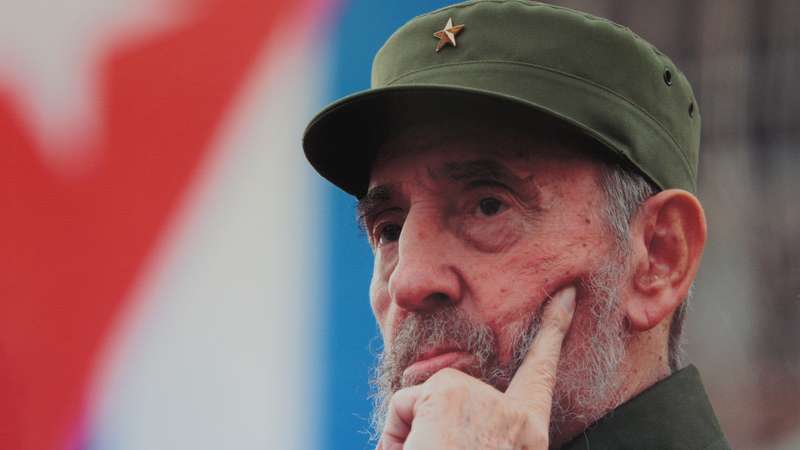5 Terrible Responses to Fidel Castro's Death From World Leaders
Politicians and tyrants alike heap praise on the despot who ruled over an island prison nation.


Upon the death of long-time Cuban dictator (retired) Fidel Castro, democratically elected politicians and brutal tyrants alike have come together to offer heartfelt tributes of the deceased.
Though President-elect Donald Trump has in the past praised vicious repression deployed by socialist dictators in Iraq and China, Trump's minimalist take on Twitter (Fidel Castro is dead!) and subsequent statement where he referred to Castro as a "brutal dictator" were welcome diversions from other political leaders' statements which have run the gamut between mealy-mouthed defenses of Castro's "complicated" legacy to slavish praise of his health care and pro-literacy initiatives.
Here are five of the worst reactions from international polticial leaders to Castro's death.
5. Ireland's President Michael Higgins
Higgins—nominally the head of state, though in Ireland's parliamentary system, the role is largely ceremonial— said in a statement:
Having survived some 600 attempts on his life, Fidel Castro, known to his peers in Cuba as 'El Comandante', became one of the longest serving Heads of State in the world, guiding the country through a remarkable process of social and political change, advocating a development path that was unique and determinedly independent.
First, as an authoritarian dictator (by definition, such people don't have "peers"), Higgins' praise of the length of Castro's reign is spectacularly dumb, as is his claim that a country which relied on the financial largess of the Soviet Union and later Venezuela (until the economic collapse of both socialist countries) was ever "determinedly independent."
Other jaw-droppers in Higgins' statement include "inequality and poverty are much less pronounced in Cuba than in surrounding nations" and that Castro would be remembered as a "giant among world leaders" who provided "freedom for his people."
One could argue that inequality is "less pronounced" in Cuba than in other Latin American countries, but only because the whole country is impoverished. However, even the "less inequality" defense goes out the window when you factor in the lavish lifestyles enjoyed by high-ranking Communist Party officials (such as Castro himself) compared to the rest of the long-suffering population forbidden to leave the country.
4. European Commission President Jean-Claude Juncker
In a statement that reads like it was produced by a bot employed by a crumbling bureaucracy, the president of the European Union's executive body wrote:
With the death of Fidel Castro, the world has lost a man who was a hero for many. He changed the course of his country and his influence reached far beyond. Fidel Castro remains one of the revolutionary figures of the 20th century. His legacy will be judged by history.
3. Iran's Supreme Leader Ayatollah Seyed Ali Khamenei
The religious tyrant who rules over one of the worst human rights-offending countries on Earth tweeted his fond memories of shooting the breeze with another dictator who brutalized his own people.
I extensively talked with #FidelCastro in person, it is his personality to believe and rely on people. 5/27/92 pic.twitter.com/CtumcSgDEj
— Khamenei.ir (@khamenei_ir) November 26, 2016
2. United Kingdom's Labor Party leader Jeremy Corbyn
The U.K.'s opposition party leader conceded Castro had "flaws"—though he wouldn't name them—but insisted in a statement that Castro was a "champion of social justice."
This must be news to the gays who were herded into labor camps following Castro's revolution, the poets and musicians imprisoned for "counter-revolutionary" expression, the exploited workers (who in the cruelest of ironies, are forbidden from unionizing), the innumerable Cubans who died trying to escape the "socialist paradise," and those who remain but are forbidden from accessing the outside world through the internet.
1. Canada's Prime Minister Justin Trudeau
Everyone's favorite woke boyfriend released a statement calling Castro a "remarkable leader" who "served his people for almost half a century" as the country's "longest serving president"—a feat less impressive when you factor in the fact that Castro's one-party government never held a free election.
Trudeau conceded Castro was a "controversial figure," and then inexplicably decided to speak for both Castro's "supporters and detractors," who he says "recognized his tremendous dedication and love for the Cuban people who had a deep and lasting affection for 'el Comandante'."


Show Comments (1277)